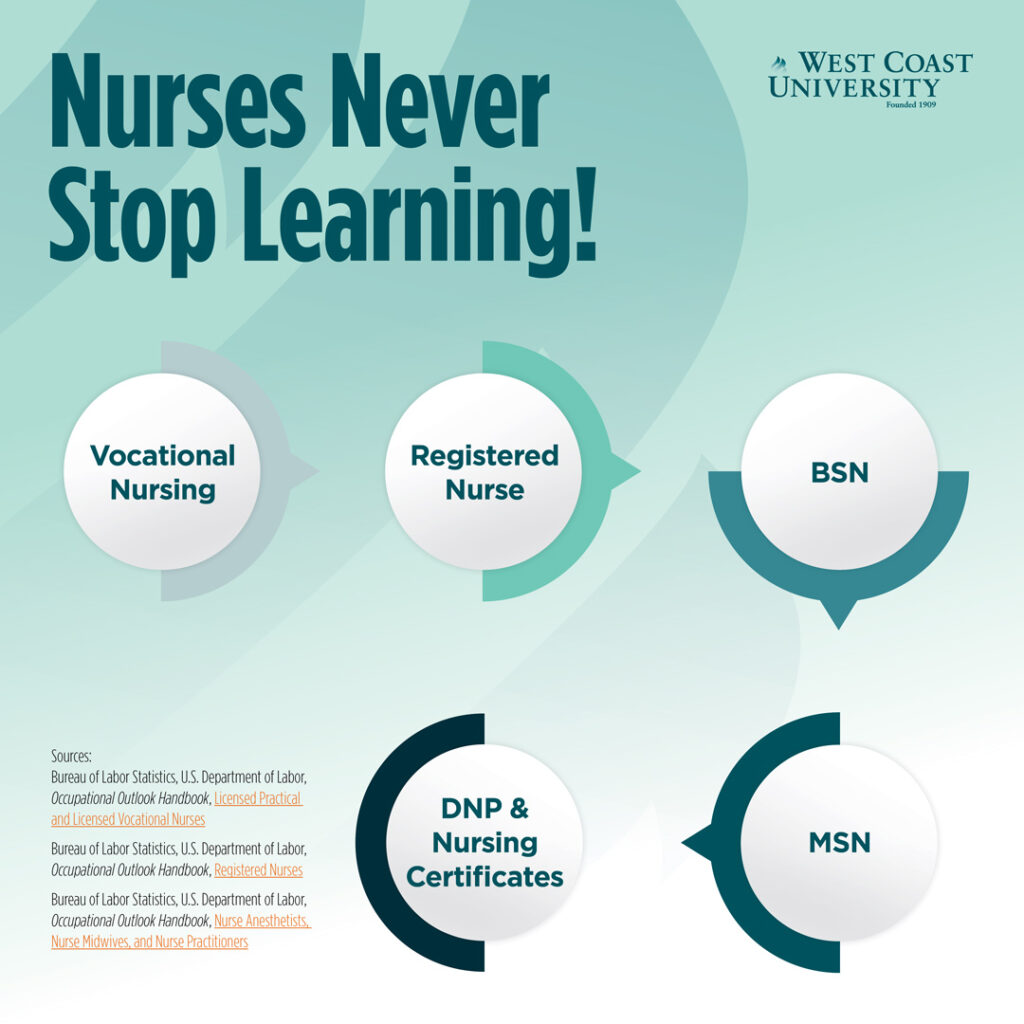Nursing is a versatile profession that offers many different nursing paths to explore. Whether you’re interested in direct patient care, teaching, or leadership, a nursing education can help you get there. Here are some of the different levels of education you can reach as a nurse.
Overview
The infographic below can give you a quick overview of the levels of education and different nursing paths available in the profession.

Vocational Nurses
Many nurses start their careers as licensed vocational nurses (LVN), also called a licensed practical nurse (LPN) in some states. These nurses focus on providing basic care and comfort to patients, including:
- Checking vital signs
- Changing bandages
- Helping patients bathe or dress
- Listening to patient concerns1
What’s the next step? Vocational nurses who want to take on more responsibility can become registered nurses (RNs) through our LVN/LPN to BSN program. This program allows you to leverage your existing nursing knowledge to streamline your degree.
Registered Nurses
Becoming a licensed RN is also a common starting point for many nurses. As an RN, nurses can perform the same tasks as an LVN, while also delivering more complex care, such as:
- Assessing patient condition
- Developing care plans
- Helping with diagnostic tests
- Educating patients on their health conditions2
What’s the next step? RNs can earn their bachelor’s degree online with our RN to BSN program! Study through our virtual classroom while completing clinical hours at a location near you. RNs who want to pursue an advanced practice specialty should also consider our RN to MSN program, which allows you to proceed straight from undergraduate to graduate classes, streamlining your path to a master’s degree.
Bachelor of Science in Nursing
A Bachelor of Science in Nursing (BSN) is a four-year degree that prepares students to become efficient and compassionate nurses. It typically includes relevant coursework, such as anatomy and physiology, as well as clinical hours where students get hands-on experience working with patients.
While you do not need any nursing experience to pursue your BSN, students who already have an LVN or RN license can get credit for their previous education and earn their degree faster. There are many reasons why nurses choose to earn their BSN. According to the American Association of Colleges of Nursing:
- 77.4% of employers expressed a strong preference for BSN graduates
- 40.6% of hospitals and healthcare settings are requiring new hires to have a bachelor’s degree3
This means that earning their BSN is a great way for LVNs and RNs to explore new nursing opportunities.
What’s the next step? Once you have your BSN, there are many more different nursing paths available! Consider specializing in your top area of interest through a master’s degree in nursing.
Master of Science in Nursing
A Master of Science in Nursing (MSN) is a graduate-level nursing degree that prepares you for advanced practice roles, leadership positions, and teaching opportunities. At WCU, we offer multiple specialized tracks to choose from, all of which allow you to complete your classes online:
- Adult-Gerontology Acute Care Nurse Practitioner
- Adult-Gerontology Primary Care Nurse Practitioner
- Family Nurse Practitioner
- Nurse Educator
- Nurse Leader
- Psychiatric-Mental Health Nurse Practitioner
What’s the next step? If you already have a master’s degree and want to explore a different specialty, you can do so through our post-master’s certificates. Additionally, you can also prepare for executive leadership roles through our Doctor of Nursing Practice (DNP) program.
Post-Master’s Nursing Certificates
Post-master’s certificates allow you to gain skills and knowledge in your chosen specialized nursing field. The coursework is designed to help you prepare for relevant board certification exams. We offer the same specialized tracks as the MSN program:
- Adult-Gerontology Acute Care Nurse Practitioner
- Adult-Gerontology Primary Care Nurse Practitioner
- Family Nurse Practitioner
- Nurse Educator
- Nurse Leader
- Psychiatric-Mental Health Nurse Practitioner
Doctor of Nursing Practice
A Doctor of Nursing Practice (DNP) is the highest degree you can earn in nursing. It helps equip you to take on executive leadership roles. At WCU, our online DNP curriculum includes training on strategic leadership, healthcare informatics, and policy development.
Exploring Different Nursing Paths: Which Is Right for YOU?
Every nurse has different talents and goals. There is no one-size-fits-all approach to nursing education, but we hope the information we provided gives you a better idea of which different nursing path is right for you. If you have any questions or want to talk to an advisor about our programs, scroll down to the bottom of this page to request more information. You can also schedule a tour at one of our campuses.
WCU provides career guidance and assistance but cannot guarantee employment.
WCU distance education programs are delivered out of the California and Texas campuses and may not be available to residents in all states.
Practice experience is required in order to graduate from the RN to BSN, RN to MSN, MSN, DNP degree, and Post-Master’s Certificate programs.
1 Bureau of Labor Statistics, U.S. Department of Labor, Occupational Outlook Handbook, Licensed Practical and Licensed Vocational Nurses
2 Bureau of Labor Statistics, U.S. Department of Labor, Occupational Outlook Handbook, Registered Nurses
3 American Association of Colleges of Nursing, “Employment of New Nurse Graduates and Employer Preferences for Baccalaureate-Prepared Nurses,” October 2021
WCU provides career guidance and assistance but cannot guarantee employment. The views and opinions expressed are those of the individuals and do not necessarily reflect the beliefs or position of the school or of any instructor or student.



